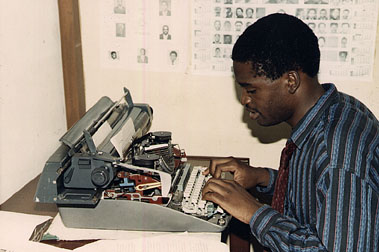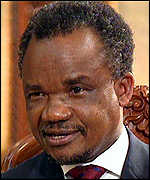| This page is managed by  Maidstone Mulenga. Quick facts on Zambia  Zambia's Coat of Arms
|
|
IT'S TIME FOR CHILUBA TO GO
Enough already. Zambia has been disgraced and debased enough. It's time for an evolution, a complete change in the mentality of how we run Zambia. At 36 years old, Zambia has no luxury of a young nation. Time is now to charter our future course economically, socially and politically. Let's start with the highest office in the land -- the presidency. President Frederick Chiluba, like his predecessor Kenneth Kaunda, has outlived his usefulness and must gracefully leave office. And with him should go every member of his Cabinet. True, there were some new faces but most of them were behaving like the Kaunda stooges just after a few months in office. Look at how brilliant and intelligent people like Levi Mwanawasa, Vincent Malambo and Eric Silwamba. They turned from being guardians of the Constitution to manipulators of the laws for the government's sake. Look at how pro-workers' leaders like Newstead Zimba and Chitalu Sampa turned their backs on the trade unions once they were enshrined in their Cabinet posts. For several years, I covered Malambo, Silwamba and Mwanawasa argue vehemently in courts against Kaunda for misusing his power as head of state to detain people and confiscate their property. Watching them was a heart-warming because they truly showed themselves to be vanguards of the law. My heart jumped for joy when they joined MMD to push for change on the political front. During the same period, I excitedly went to trade union meetings to hear then President-General of the Zambia Congress of Trade Union Chiluba and Deputy-Chairman-General Sampa and then Secretary-General Zimba push for the human rights not only of the workers but the general population as well. These were leaders who would rather go to prison than denounce the workers on strike. That was only a decade ago. But ten years later, Zambia faces the reality that it got a poor deal. Ten years later, Silwamba and Malambo act as though the Constitution and the laws are there to protect the government and not the people. Ten years later, Silwamba and Malambo are putting forth similar arguments as those by Professor Patrick Mvunga when he defended Kaunda's actions in court. Apparently the two just switched sides because Mvunga is just protesting the same rules that he had helped defend. What a comedy! Ten years later, Chiluba, Zimba and Sampa have turned their backs on the workers -- the very workers who went on strike to pave the way for MMD rise to power. When the workers threaten to strike over poor conditions of services and lousy salaries, the former trade union leaders -- now government ministers -- threaten to use the same force they fought against. For the love of Zambia, I can't figure out who the real Chiluba, Sampa or Zimba are. Were these truly union leaders concerned about their plight of workers or were they just politicians in different attire using good-sounding words to stay in power at ZCTU? I am inclined to believe the latter. It reminds me of the time Chiluba fought tooth and nail to remain chairman of NUBEGW, even when it was clear the workers did not want him. That is why the complete change is needed. Zambia needs new leaders who will take the nation out of the political mire that it has been sinking in since 1991.
Just let the facts speak. In 1993, two years into Chiluba's reign, Zambia had a bumper maize crop of about 20 billion bags, 8 billion more than Zambia required for internal consumption. But Chiluba's government ended up importing maize and then subsidizing it when it was sold the public. Something is terribly wrong when the country ends up importing the staple crop while the local crop rots on farmers' fields. Chiluba can't blame this on Kaunda. Despite this, there was a widespread feeling among donor countries that Zambia was handling its structural adjustment program satisfactorily. Several donors signified their willingness to reschedule or cancel Zambia's debts. But the government messed it up, with Chiluba declaring a state of emergency and detaining opposition leaders after the discovery of an alleged plot to overthrow the government. Although Chiluba later lifted the state of emergency, he lost several credible members of his Cabinet. Chiluba fired Guy Scott, minister of Agriculture, who seems to have developed a good rapport with donors. Others like Arthur Wina, minister of Education, were critical of what they saw as the government's failure to check corruption and drug dealing. Wina, however, had the Kaunda baggage was clearly still bitter about losing the MMD chairmanship to Chiluba. It was no surprise that he went and formed a new party, National Party (NP). The new party was co-led with Enoch Kavindele, perhaps Zambia's biggest political player, who shameless went back to MMD after being offered a new position. Kavindele, too, was a Kaunda hang-on and offered nothing new his new party or Chiluba's government.
As the rate of inflation rose to about 142%, the donors warned Chiluba and his government to stop being used as center for drug trafficking, especially by people in the government, or risk losing the promised aid. Chiluba had included in his government people who had been convicted of drug charges during the Kaunda era. In bid to appease the donors, Chiluba privatized 63 government-owned companies. Meanwhile, a number of ministers had resigned in order, they said, that false claims of their having been involved in drug trafficking could be thoroughly investigated.
The debacle of maize continued in 1994 as the government allowed cheaper maize to be imported from South Africa at the expense of local farmers and consumers. Although the traders were buying maize at the cheaper rate from South Africa, they were charging consumers of mealie meal exorbitant prices that pushed the staple food out the price range of most Zambians.
In April 1994, Chiluba pulled the Kaunda trick as far the University of Zambia was concerned. After failing to reason with lecturers and workers who were demanding equality pay, he ordered the closure of the university and fired 300 lecturers and research workers for taking part in a strike. Chiluba, a former trade unionist effectively bit the hand that fed him. Ironically, Chiluba was taking private lessons for his so-called master's degree.
In July 1995, Minister of Commerce Dipak Patel admitted that 5.5 million of Zambia's 9.5 million people were living in abject poverty. With a penchant for theatrics, Chiluba ordered his ministers and members of parliament to declare their assets and fired Bank of Zambia Governor Dominic Mulaisho for continued decline of the Kwacha. Meanwhile, Chiluba�s own identity came to fore. After being accused -- and failing to prove otherwise -- of being a foreigner, Chiluba turned the tide on his predecessor, Kaunda. Chiluba accused Kaunda of having been president of the country for five years before renouncing his Malawian citizenship. And in a bid to stop Kaunda from running for president again, Chiluba used the MMD majority in parliament in May 1996 to change the constitution, requiring candidates for president to show that both their parents were Zambians by birth. This despite, assuring the Paris Club in March that the country will remain democratic. In another bid to ensure his stay at State House, Chiluba detained eight members of Kaunda's party, including deputy party leader Inyambo Yeta, and put them on trial on charges of treason. The government also put two journalists on a sham trial and then sentenced them to indefinite imprisonment in a blatant attempt to silence the opposing voices. Chiluba even threatened journalists abroad with imprisonment if they ever returned home. With the main opposition party boycotting the election, President Chiluba's Movement for Multiparty Democracy easily won an overwhelming victory, winning most of the 150 seats in the National Assembly.
After securing his victory at the polls, Chiluba set his eyes on appeasing the International Monetary Fund and the World Bank with a structural adjustment that worsened the growing poverty of the rural population. Chiluba's privatization of public companies led to the loss of 150,000 jobs in 1997.
Still Chiluba was not done with his autocratic behavior, proposing legislation to regulate the press. He also authorized his police force to act without regard to law. In one event, the overzealous police fired on an opposition rally on August 23, wounding Kaunda and Roger Chongwe, another opposition leader. Nearly a month later, serious tensions arose in Lusaka, leading to an attempted military coup on October 28. Although the coup was easily thwarted, the professed objective of the coup -- to stop the country from going to ruin -- provided evidence of the failure of the government's policies to gain the confidence of the general public. At the same time, the stern measures adopted by the government in the wake of the failed coup confirmed critics in their views that democracy no longer prevailed in Zambia. On December 25 Kaunda was arrested on charges of inciting the attempted coup. Six days later Kaunda was released but placed under house arrest.
Chiluba also used the attempted coup to impose a state of emergency and continue it in 1998. Pressure from the donor community forced Chiluba to release Kaunda from house arrest, and all charges against him of concealing knowledge of the attempted coup were withdrawn. During the year, the optimistic budget introduced by Finance Minister Ronald Penza started to falter as the extent of Zambia's economic problems could not be concealed. When donors decline to give more to Zambia, Chiluba dismissed Penza and replaced him with Edith Nawakwi, minister of Agriculture who had little or no background in economics. When Penza was murdered on November 6, 1998, fingers pointed to the government although no concert evidence was found. Floods in parts of the country coupled with drought in others forced the government to plan to import 400,000 metric tons of corn.
In January 1999, Chiluba again resume his hobby of harassing the opposition, this time warning Kaunda that if he wished to continue in politics he would forfeit the financial benefits of retirement. In March, a judge ruled that Kaunda should be stripped of his Zambian citizenship because his parents were from Malawi and that he had held office illegally for most of his period in government. In the same month, the government arrested six journalists of The Post, Zambia's only independent newspaper, for having reported that Zambia's army was inferior to the Angolan army. The government compounded its action by releasing them because grounds for their detention were lacking, only to re-arrest them on a charge of espionage arising from the same report. Maj. Wezi Kaunda, who had been expected to succeed his father as head of UNIP, was murdered on November 4 .
And then in 2000? Please let's not even go there.
For information about Zambian politics, click on
Zambia, My Zambia
|